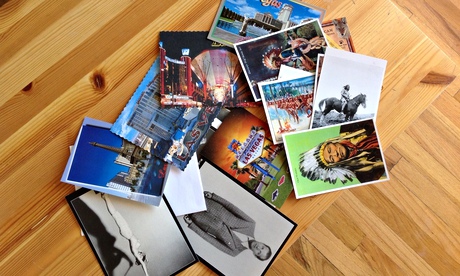
In the wake of a new survey which revealed a dramatic drop in author incomes, the award-winning Irish writer Julian Gough is funding his new novel with an unusual Kickstarter offering backers the opportunity to receive postcards from Las Vegas bearing whisky stains, lipstick, and even bullet holes.
Gough has dubbed his "economic-slash-literary experiment" Litcoin, and hopes the concept might be copied or modified by other writers. Winner of the BBC short story prize in 2007, and author of novels including Jude in London and Juno and Juliet, Gough says he was inspired "by the fact that James Joyce died leaving an estate valued in total at £908 … but a single letter handwritten by him sold after his death for $445,000", a situation he describes as a "massive market failure". He hopes his project – which has been hugely overfunded – could "help remodel the economics of writing".
The idea of asking his readers for help came to Gough while he was finishing his new novel Infinite Ammo, which is set in Las Vegas. The author found he needed a final research trip to the city, and although he received help with flights and accommodation from the Downtown Project in Las Vegas, he "just didn't have enough money to live on for the month, and there was only a week or two to go before I flew out".
So he put together the Kickstarter, to which readers can pledge between $1 and $10,000. For $25, backers will receive a coffee or whiskey-stained postcard from Gough in Las Vegas; for $50, it will also feature lipstick; for $100, a bullet hole; for $500, it will be written in Gough's own blood. Gough was hoping to raise $1,500 to help him fund his trip. The Kickstarter, which closes on Wednesday, is already topping $7,300.
"Warning: I intend to shoot each card individually, so they may smell of cordite," writes Gough on the $100 pledge for a bullet-holed postcard – of which 12 have already been sold. "I may write a message on this card implying that I died while writing it. I may also imply that you were my only true love."
Of the $500 postcards – three of which are offered, but none yet sold – he says he will "happily write these postcards, in my own blood, if you're prepared to support me and my writing at this level. You'll be buying me two weeks of uninterrupted writing and research … A caveat: The postcards will probably be short. A friend of mine who's a doctor will tap the blood, so I'll have a vial's worth to work from, and my blood is pretty thick, so I won't be writing War and Peace here."
"It's gone amazingly, almost worryingly well," said Gough. "I didn't promote it at all in advance; I just quietly launched it, and then told my people about it on Twitter. Within four hours, I'd exceeded my target. Within 48 hours, I'd doubled my target. It's now almost 400% funded, and still rising. I'm going to have to buy a LOT more postcards."
After a survey from the Authors' Licensing and Collecting Society showed last month that the median income of the professional author in 2013 was just £11,000, Gough said that "as a society, we really value our most original storytellers, the men and women experimenting with literature, forming the future, we give them really high status; but no money".
"Advances for weird, interesting books have evaporated," said Gough. "Their choice now is write and starve, or work purely for money full-time, and have no time and energy and headspace to write. That's a market failure. So I wanted to see if I could invent a new economic model that could turn the affection in the reader's heart into food in the writer's fridge."
The novelist said that a Swiss think-tank has already been in touch about the idea of Litcoin, "so who knows, maybe this is the start of something". "I feel tremendous affection for some of my favourite writers, and I would love to help them write their next work, if there was a simple lever I could pull to do that. And I know a lot of my readers feel the same way about me," he said. "But charity is a dead end. I want to create a model that benefits writer and reader. So if I can help invent some kind of Litcoin, some kind of new asset, new currency, that funds the writers I love, and that also gives their readers an interesting, very personal, physical asset that might even be worth something one day, so everybody wins, then I'd be pretty happy."

